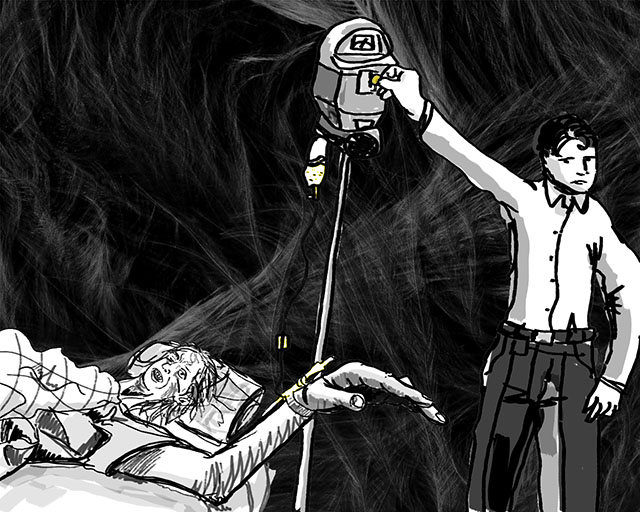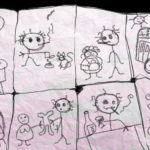How we care
You have to enter a security code to get into the front gate at Summit Care[1], you can’t even wander in inquisitively, seeking to discover what this place will be like for your aging (and admittedly soon to be dying) loved one, or simply trying to find out how this place would feel for your loved one who will be interned there. You are barred instantly and treated as a security threat. They welcome you after you buzz, with smiles, and tell you it is for the patients safety, meaning, that the patients (sorry, residents) will actually try to escape through frustration, deep seated desire or a human angst[2]. Meaning, as they smile, that sometimes these old people get a little crazy; Alzheimer’s or Dementia, you know (roll their eyes as if you understand) and you do understand, you do think for a second that yeah, minimum security prison grade policies may actually be necessary in order to protect your own loved one from….wait…my loved one will be locked IN here. “So you are trying to avoid the logistical nightmare of having a patient (sorry, resident) escape?” through their own real true emotion into the world they are legally allowed to live in and do what ever they want in like we all do every single day whilst we are able bodied and able mined and so your policies are there to stop motivated inmates (sorry residents) from escaping? “Yes, basically”. All because the families of these ‘insane, interned’ loved ones want to know for god damned sure grandma or grandpa or whoever is FUCKING WHERE THEY ARE SUPPOSED TO BE BECAUSE I PAID GOOD GOD DAMNED MONEY FOR THIS[3]. Hence the security gate. Once inside, you quickly realise it is a hospice, the floors are that glimmering white reflective bleached surface, the rooms are equipped with all the buttons and tubes and horrific necessities to keep the forgotten almost-dead alive. It’s a maze, the signs really only help the staff: wards, rooms, examination rooms, clinics, arrows and/or numbers for each, letters for all[4], the madness of the organisation already kills you, fills you with bureaucratic hate, you can imagine how someone could be left dead in their room for days because they slept in the wrong ward, the wrong bed in the wrong ward, wandered in and laid down in a spot for Mrs. Jenkins and got the wrong food or medicine, got a different indifferent doctor who peered at their charts and deemed this human being “ok” for another day based on improper stats and “keep her on these pills” and “give her some aspirin, its ok”, will not go down so well. It’s always ok for aspirin! Thins the blood! Clears the head! A wonder drug! I went along, turning down a hallway, walking, turning down a hallway, walking, looking into the rooms to see the aged dying in their beds, staring at the television or at the roof, with cute and differing blankets, no doubt gifts from their loving families, and the various accoutrements befitting a personalised experience, namely; pictures, a pile of books, flowers (fake) and/or perhaps maybe some trinkets of some kind, all jewellery has been striped as if these gradually (eventually) dying bodies have no use for it, as though they have transcended the need for bodily adornments that we continue to cherish, it is a kind of respect that we think of the aged that in their decline they have no need or want for pointless extravagances, the things we strive day in and day out to gain, wear and exemplify. Turning, walking. When I finally reach my Great Aunt’s room, uninvited, unexpected, I see her sitting staring out the window to her view of trees swaying in the wind (her window is not able to be opened), wearing full make up, as in, eye shadow, lipstick, foundation and mascara. It is a revelation, after all I have just waded though, after all the horror and existential realisation of the reality of life, the base-honesty of the end of days, I come to see my Great Aunt sitting there, serenely, watching the branches of a tree waving in the breeze, breathing oxygen though a tube, sitting in a room no bigger than a toilet at a fine dining restaurant, with a ready-to-go make up complexion. It’s not that I despise the others (who are clearly further along either the death path or the neglect path[5]) in their beds, staring, mostly with mouths opened, dry tongues and throats, only wanting water and all I want is to pour water into their mouths, from the supplied baby-blue jugs….god damn it, it’s the neglect, the lack of care or love, really. Yet the care is top notch: good food, good emergency buzz to response ratio, no clichéd abuse.
She told me a story, how she heard another lady crying out for help, just saying “help”, that one word out loud…repeating it until help arrives…scares the shit out of me but makes me listen more intently, to hear that as my own loved one heard these words coming from a stranger in a nearby room she pushed her own emergency button to call attention to this other persons harrowing plight… it was then that it dawned on me the full horror; that the day in day out mode of this place is always on the verge of death, on disaster, or bizarre “other” assisted living complications, leading to more assistance in just living. Can you imagine actually calling out the simple single word “help”, in muted tones, in meek weak frustrated simple tones…”help”. “Help me” is even worse. That you can muster both the word ‘me’ and the spiritual fortitude to add a self reference, it is an even deeper plight, to be able to add it on yet still so in need and cringingly self aware[6]. The story ends with the woman in the next room being attended to, getting a nurse, but the outcome following that is unknown[7].
As far as concepts go, nursing homes are by far the most modern, oblique, torturous, yet tantalising, and curious forms of humane human treatment in existence[8]. Those placing their loved ones in such institutions do so because either they (a) cannot care for them themselves or because (b) they do not want to care for them themselves. Simple, really. All other stories are self-serving lying justifications that often involve arms held by the side of the body, open forearms bent outwards at the elbows with palms either almost horizontal to the ground or fully horizontal to the ground, i.e. a typical “what else could I do” gesture we are all used to seeing from incompetent, ineffectual shallow humans (90% of them FYI). Add a shrug and a stupid face for good measure and we have there the visage of a typical type (b) as above ‘power of attorney[9]‘ type of guardian. You can not argue with type (a) scenarios, really, if you actually can not subsist with this person than sure, help them out as best you can. But I can’t help but think that the majority of cases reside under type (b) conditions. It could be my own morose bias, or it could be the fact that (b) is the most likely default human condition, the one which is the easiest (read: least work) action to enact. Nevertheless the implementation of this type of care in this type of institution is a new model for understanding the outcome of longevity, the reason for advances in technology, medicine, palliative care, scientific awareness, psychiatry, religion (treatment of the less fortunate resonates), meaning of existence, wisdom, the point of life, ergo philosophy, biology et al. The perhaps deeper realisation of the type (b) condition is in the desire that they actually want their loved one to die, painlessly and comfortably, sure, but, that they actually would in some way or another prefer them to be dead (read: dealt with, as per the definite outcome of this interment anyway…they are not going to get better, they are not sick…this is not a hospital). Discounting the fact that our aging loved ones are a monetary burden in the short term, there is the (being nice) emotional burden, the (less nice) physical burden vis-à-vis visits/upkeep, the social reporting aspect (“yes she/he is still with us”, and follow ups), and all kinds of general health related worry as diligent updates pour in (or trickle in either way, depending on health, read: depending on how early you admitted them, urgh). Cynically it would seem that for type (b) administrators, the worse the conditions in a nursing home were the better it is for them. The horrendous dual awareness that the facilities’ features can be measured against a loved ones living potential versus the actual inside feeling of whether or not their comfort at the end of days is worth more to you over their (via superior treatment) prolonged life. Then the complexity of making that type of decision for them. As in, is it better they live a long life in good care for no discernable reason or better to die sooner in worse care for the good of everyone (including the patient/loved one/burden)? That the rate of death can be measured against facility features is astounding (and actually probable). This kind of awareness had better be working on levels that type (b)’s do not have access to…
And then this term: Respite Care. Discuss.
[1] An aged care facility, or in oldspeak a nursing home or in older speak a death house
[2] That is to say, a normal human response
[3] Not really, as I found out, it’s $2000 a month for a small private room. I can only guess at the lower rates for a shared room. How many people are there that would want to allow themselves, let alone an aging loved one, to live out the rest of their days in a communal room?
[4] For example my loved one is in room 12A in ward E in department GREEN on level 2. So…
[5] Those two things are unfortunately intertwined in an institutional sense
[6] Which makes it worse I imagine, it denotes hope or the belief that there is a solution, this is not the end (this time), you are still you, a ‘me’, who can, no, will be helped
[7] The patients (admittances, temporary residents, internments?) do not tend to mix often, as if their one sole battle of simply staying alive for whatever reason we have created that makes that important is the only thing to focus on. Also perhaps why staring out a window (if you have one), completing the entire P.D. James anthology, listening to AM radio talk back endlessly or keeping relevant clippings from the newspaper to offer to discerning guests or whatever it is becomes the raison d’être
[8] I will accept an analogy with the education system as a possible ulterior candidate, but unlike aged care, the goal of education is not really to make death comfortable/palatable/easier. Although I do admit even that could be argued…
[9] http://www.summitcare.com.au/admissionhelp_powerofattorney.html





